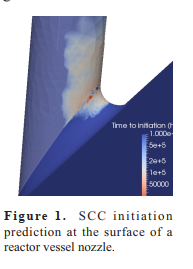Stress Corrosion Cracking simulation as a support to engineering
Thierry COUVANT
EDF R&D, avenue des Renardières, 77818 Moret-sur-Loing, France
EXTENDED ABSTRACT: As a consequence of the operational experience on nickel alloys and stainless steels, EDF needs to understand observed in-service Stress Corrosion Cracking (SCC) and to optimize the control frequency of components. It is also necessary to evaluate possible mitigating methods in operating Pressurized Water reactors (PWRs): changes in water chemistry (increasing dissolved hydrogen, zinc injection), improvement of surface finishes (introducing compressive stresses), replacement of materials (increasing chromium content) or changes in design (reducing stress concentrations). Such mitigations aim at extend the lifetime of components. In this context, current R&D studies aimed at improving the prediction of SCC, upgrading and developing new models implemented in a dedicated software, named Code_Coriolis [1], to evaluate the SCC susceptibility of components, such as, for example, reactor vessel nozzles, bolts [2, 3] and pins. Code_Coriolis is a 3D Finite Element Modeling (FEM) post analysis, closer to the actual situation than traditional 1D or 2D approaches. Kinetics and crack growth paths are predicted. Statistics on initiation time and cracking locations are possible. FEM post analysis allows to better evaluate the relevance of SCC models and to better fit model parameters, chaining initiation with crack growth at large scales (from nanometers to centimeters). Thus, analyses are not restricted to a single stage of the degradation and a global view of the degradation is systematically delivered. First, the methodology allows reducing/clarifying some classical assumptions (total stress, initiation depth, chaining between SCC stages…) regarding models. Second, the methodology allows to rapidly quantify factors of improvement (FOI) of components as soon as a mitigation is envisaged.

REFERENCES
[1] T. Couvant, 18th International Conference on environmental degradation of materials in nuclear power systems – water reactors, Portland, USA, (2017).
[2] T. Couvant, E. Burger, C. Thaury, C. Rainasse, 19th International Conference on environmental degradation of materials in nuclear power systems – water reactors, Boston, USA, (2019).
[3] T. Couvant, M. Dib, Y. Shen, C. Thaury, F. Oliveira, C. Rainasse, P. Grandclément, 9th Fontevraud International Conference, Avignon, France, (2018).

T. COUVANT has completed his PhD in 2003. He was employed at EDF as a research engineer, then as a project manager. He’s now a corrosion expert. His main activity is dedicated to the improvement of the branching between research and engineering, based on experiments, development of models and digital tools addressing corrosion.